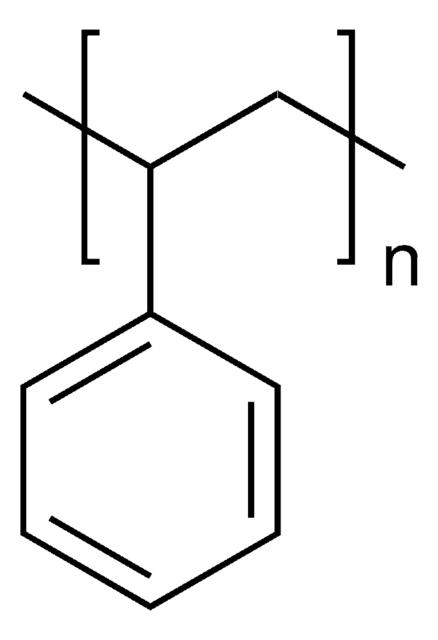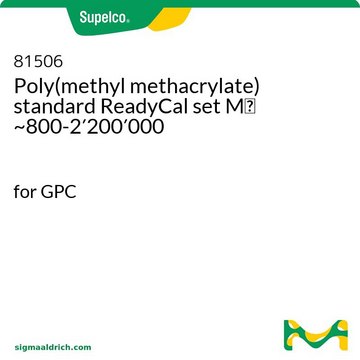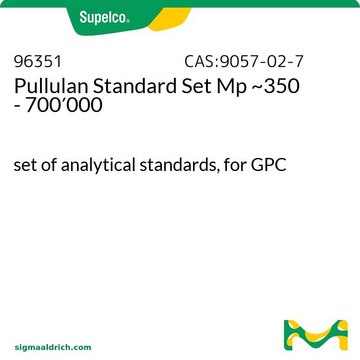76552
Polystyrene (low molecular) Standard ReadyCal Set M(p) ~250-65000
for GPC
Faça loginpara ver os preços organizacionais e de contrato
About This Item
Código UNSPSC:
41116107
NACRES:
NA.24
Produtos recomendados
grau
for GPC
Nível de qualidade
prazo de validade
limited shelf life, expiry date on the label
técnica(s)
gel permeation chromatography (GPC): suitable
Formato
neat
temperatura de armazenamento
2-8°C
Componentes
ReadyCal Standards are polymer cocktails pre-weighed into autosampler vials for the convenient calibration of GPC/SEC/GFC systems.
This kit contains 10 sets of 3 color-coded vials, each containing four polystyrenes of different molar masses. Molar masses range from ~266 to ~66,000 Da and are carefully selected so that polymer traces are baseline separated.
Sufficient material provided for at least 10 calibrations.
Suitable for calibrations in THF, toluene, DMF, DMAc, chloroform, TCB, DCB and NMP.
This kit contains 10 sets of 3 color-coded vials, each containing four polystyrenes of different molar masses. Molar masses range from ~266 to ~66,000 Da and are carefully selected so that polymer traces are baseline separated.
Sufficient material provided for at least 10 calibrations.
Suitable for calibrations in THF, toluene, DMF, DMAc, chloroform, TCB, DCB and NMP.
Código de classe de armazenamento
11 - Combustible Solids
Ponto de fulgor (°F)
No data available
Ponto de fulgor (°C)
No data available
Escolha uma das versões mais recentes:
Já possui este produto?
Encontre a documentação dos produtos que você adquiriu recentemente na biblioteca de documentos.
Os clientes também visualizaram
Barbara De Meester et al.
Nature communications, 11(1), 5020-5020 (2020-10-08)
Lignin causes lignocellulosic biomass recalcitrance to enzymatic hydrolysis. Engineered low-lignin plants have reduced recalcitrance but often exhibit yield penalties, offsetting their gains in fermentable sugar yield. Here, CRISPR/Cas9-generated CCR2(-/*) line 12 poplars have one knockout CCR2 allele while the other
Nossa equipe de cientistas tem experiência em todas as áreas de pesquisa, incluindo Life Sciences, ciência de materiais, síntese química, cromatografia, química analítica e muitas outras.
Entre em contato com a assistência técnica





